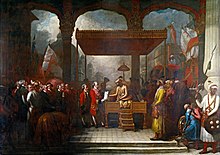Treaty of Allahabad


The Treaty of Allahabad was signed on 16 August 1765, between the Mughal Emperor Shah Alam II, son of the late Emperor Alamgir II, and Robert, Lord Clive, of the East India Company, as a result of the Battle of Buxar of 22 October 1764. The Treaty marks the political and constitutional involvement and the beginning of British rule in India.[1] Based on the terms of the agreement, Alam granted the East India Company Diwani rights, or the right to collect taxes on behalf of the Emperor from the eastern province of Bengal-Bihar-Orissa.Thus East India Company got appointed as the imperial tax collector for the Eastern province(Bengal-Bihar-Orissa). These rights allowed the Company to collect revenue directly from the people of Bengal, Bihar and Orissa. In return, the Company paid an annual tribute of twenty-six lakhs of rupees (equal to 260,000 pounds sterling) while securing for Shah Alam II the districts of Kora and Allahabad. The tribute money paid to the emperor was for the maintenance of the Emperor's court in Allahabad. The accord also dictated that Shah Alam be restored to the province of Varanasi as long as he continued to pay certain amount of revenue to the Company. Awadh was returned to Shuja-ud-Daulah, but Allahabad and Kora were taken from him. The Nawab of Awadh also had to pay fifty-three lakhs of rupees as war indemnity to the East India Company.
The Nawab of Awadh, Shuja ud Daulah, was made to pay a war indemnity of 5 million rupees to the Company. Moreover, the two signed an alliance by which the Company promised to support the Nawab against an outside attack provided he paid for services of the troops sent to his aid. This alliance made the Nawab dependent on the Company. This was the turning point in Indian History
See also
References
- ^ Bhattacherje, S. B. (1 May 2009). Encyclopaedia of Indian Events & Dates. Sterling Publishers Pvt. Ltd. pp. A-96. Retrieved 24 March 2014.
